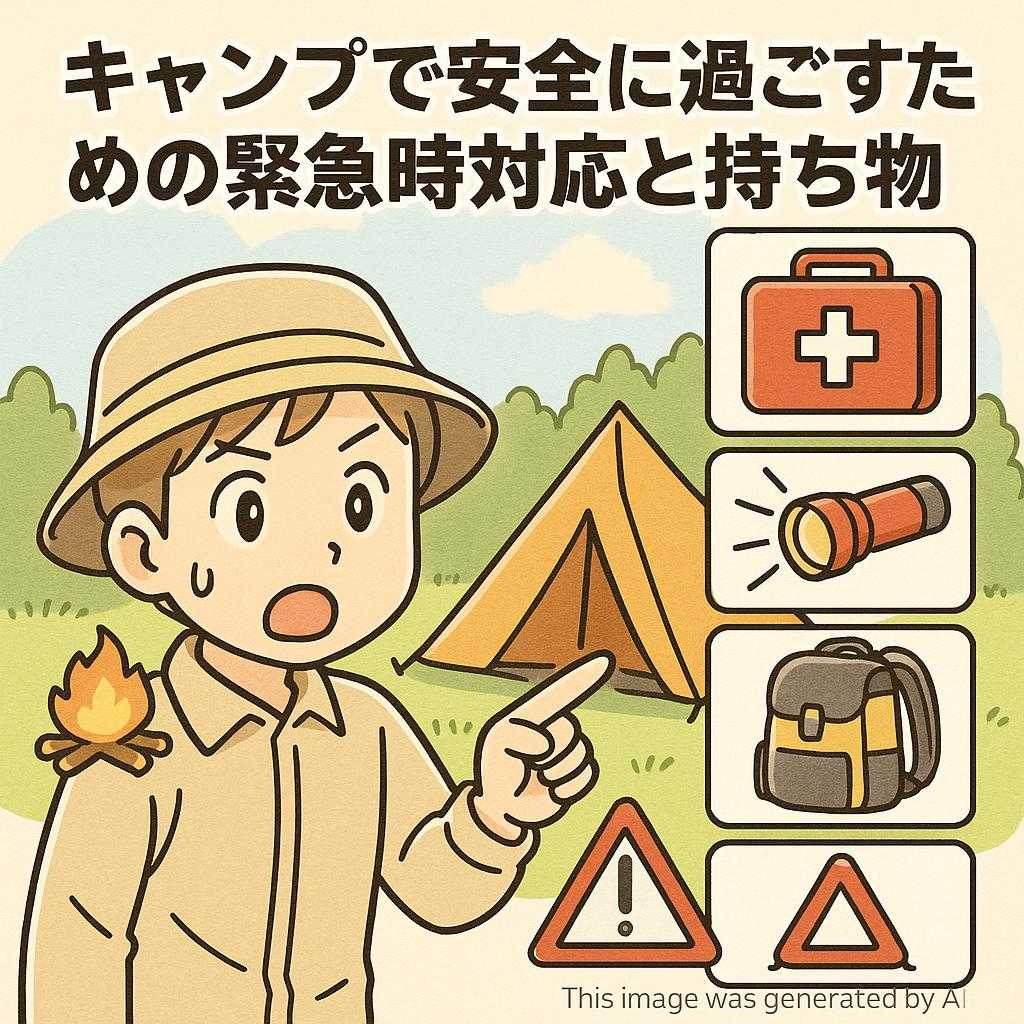
Preparation and Measures for Safe Camping
Camping is a wonderful activity to refresh in nature, but it’s important to be prepared for unexpected troubles. Especially for beginners or families, preparation to enjoy safely is essential. First, it’s important to check the rules and manners of the campsite and understand the surrounding environment. This helps prevent accidents and troubles beforehand. Additionally, since sudden illness or injury may occur at the campsite, it is recommended to bring first aid knowledge and tools. Having basic items like bandages and disinfectant in a first aid kit provides peace of mind.
Furthermore, researching nearby medical facilities in advance allows for quick response in emergencies. Since weather changes are unpredictable in natural environments, it’s also good to prepare waterproof sheets and warm clothing. Such preparation and appropriate measures ensure a safe and enjoyable camping experience.
The Importance of Safety Measures in Camping
Camping is a great way to enjoy nature, but unexpected situations can also occur. To prevent accidents and troubles and stay safe, prior preparation and knowledge are indispensable. This time, we will explain in detail about “Emergency Response and Essentials for Safe Camping.”
Basics of Emergency Response
If any trouble occurs during camping, quick and calm response is required. First and foremost, it’s important to stay calm and assess the situation without panicking. Next, to perform necessary first aid appropriately, it’s crucial to acquire basic first aid knowledge.
Preparing a First Aid Kit
Before departing for camping, be sure to prepare a first aid kit. It is recommended to include the following items in the kit:
– Disinfectant
– Bandages
– Gauze
– Bandages
– Tweezers
– Scissors
– Regular medications (such as allergy medicine and pain relievers)
These are the minimum necessary items, but the contents may vary depending on individual needs and destinations, so customize according to your situation.
Checklist of Essentials and Their Roles
The items needed for camping are diverse. To ensure safety, it’s important to understand the role each item plays.
Tent: Not only for sleeping, but also serves as a shelter in bad weather or cold conditions. Choosing an easy-to-set-up tent allows for quick response in emergencies.
Lanterns and Flashlights: Essential for ensuring visibility during nighttime activities or emergencies. Don’t forget to prepare spare batteries.
Food and Water: In emergencies, food supply may be cut off, so choose items that can be stored for a long time. Water is vital, so prepare plenty.
Choosing and Researching Campsites
Choosing the right campsite is also related to a safe camping experience. By researching reviews online and obtaining information directly from campsite owners, you can gain knowledge about specific dangers of the location.
Consideration for the Surrounding Environment
The natural environment may seem calm, but it has many potential dangers, such as harmful insects and wild animals. To protect yourself from these, prepare insect repellent and whistles. Special attention is needed when camping with small children.
Checking Nearby Facility Information
In case of an emergency, it’s advisable to check access methods to nearby hospitals and police stations. A 24-hour emergency hospital is recommended. Also, create a contact list on your mobile phone to ensure quick communication in emergencies.
Practical First Aid Methods
If someone gets injured, you may need to perform first aid yourself. Therefore, understanding basic first aid methods is very important.
Wound Treatment Methods
For abrasions or cuts, first rinse the wound with running water, then disinfect it with disinfectant. Covering it with clean gauze or bandages helps prevent infections.
Heatstroke Prevention
In summer camping, heatstroke prevention is also important. Regular hydration and taking breaks in the shade reduce the risk of heatstroke. Pay special attention on hot and humid days and manage body temperature carefully.
Summary: Mindset for Ensuring Safety
In camping, it’s not just about having fun; safety considerations are also essential. Preparation and knowledge for “what if” situations are the keys to a safe outdoor experience. With the right knowledge and equipment, you can respond calmly even in unforeseen circumstances. Most importantly, cooperation with family and friends is crucial. Assign roles and prioritize safety while enjoying your time together.
Q&A on Safety Measures in Camping
Q1: What should I do if I encounter an animal while camping?
A1: If you encounter an animal, first remain calm. It’s important to quietly leave the area without provoking the animal. Also, check the animal information of the campsite in advance and prepare countermeasure items like bear bells or sprays if necessary.
Q2: How can I prevent fires while camping?
A2: Fire prevention requires caution when making campfires. Check the wind direction and surrounding conditions and maintain an appropriate distance. Always have water or fire extinguishers on hand, and ensure the fire is completely out after use.
Q3: What should I do if the weather suddenly changes?
A3: If the weather suddenly changes, evacuating to a safe place is the top priority. Check the weather forecast in advance and learn how to set up tarps or tents to stay safe even in bad weather.
Q4: Are there any measures against insect bites?
A4: To prevent insect bites, use insect repellent spray and wear long sleeves and pants. If bitten, calmly leave the area, wash thoroughly with water, and consult a hospital. Bringing a poison remover is also reassuring.
Q5: What items are useful in emergencies?
A5: In emergencies, a first aid kit, flashlight, and mobile phone charger are useful. A multi-tool knife and whistle are also convenient. Create a checklist in advance and prepare to ensure nothing is missing.
Preparation and knowledge are key to staying safe while camping.
Summary for Safe Camping
To ensure safety while camping, preparation and knowledge are essential. First, confirm the rules and manners of the campsite and understand the surrounding environment. This helps prevent accidents and troubles beforehand. Also, prepare a first aid kit and acquire first aid knowledge. Disinfectant and bandages are minimum necessary items, and customize according to the situation.
Furthermore, creating a checklist of essentials and understanding their roles is important. In addition to tents and lanterns, prepare plenty of food and water. Don’t forget waterproof sheets and warm clothing to adapt to weather changes.
Choosing the right campsite is also related to a safe camping experience. By researching reviews online, you can gain knowledge about specific dangers of the location. Quick response is required in emergencies, so it’s recommended to check access methods to nearby hospitals and police stations.
Ultimately, cooperation with family and friends is crucial for a safe and enjoyable time. Assign roles and ensure calm responses in unforeseen circumstances. Such preparation and consideration ensure a safe and enjoyable camping experience.



